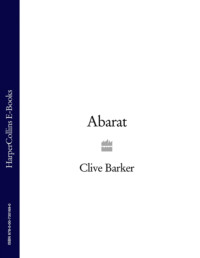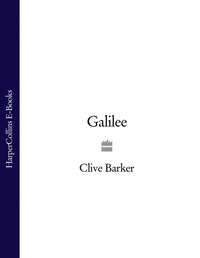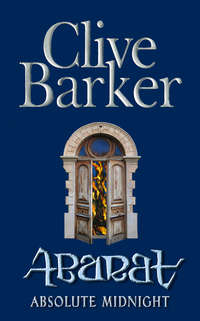
Полная версия
Weaveworld
The wheeling sound, and the picture it evoked, began to dizzy him. He suddenly felt weak, even afraid.
This was no time for such frailties, he chided himself. He had to claim the bird before it flew off again. He picked up his pace. At the top of the stairs he manœuvred past several items of bedroom furniture, and opened one of the several doors that he was presented with. The room he had chosen was adjacent to the one whose sill 33 occupied. Sun streamed through the curtainless window; the stale heat brought fresh sweat to his brow. The room had been emptied of furniture, the only souvenir of occupancy a calendar for the year 1961. On it, a photograph of a lion beneath a tree, its shaggy, monolithic head laid on vast paws, its gaze contemplative.
Cal went out on to the landing again, selected another door, and was this time delivered into the right room. There, beyond the grimy glass, was the pigeon.
Now it was all a question of tactics. He had to be careful not to startle the bird. He approached the window cautiously. On the sun-drenched sill 33 cocked its head, and blinked its eye, but made no move. Cal held his breath, and put his hands on the frame to haul the window up, but there was no budging it. A quick perusal showed why. The frame had been sealed up years ago, a dozen or more nails driven deep into the wood. A primitive form of crime prevention, but no doubt reassuring to an old woman living alone.
From the yard below, he heard Gideon’s voice. Peering down, he could just see the trio dragging a large rolled-up carpet out of the house, Gideon giving orders in a ceaseless stream.
‘– to my left, Bazo. Left! Don’t you know which is your left?’
‘I’m going left.’
‘Not your left, yer idiot. My left.’
The bird on the sill was undisturbed by this commotion. It seemed quite happy on its perch.
Cal headed back downstairs, deciding as he went that the only option remaining was to climb up on to the yard wall and see if he couldn’t coax the bird down from there. He cursed himself for not having brought a pocketful of grain. Coos and sweet words would just have to do.
By the time he stepped out into the heat of the yard once more, the removal men had successfully manhandled the carpet out of the house, and were taking a rest after their exertions.
‘No luck?’ said Shane, seeing Cal emerge.
‘The window won’t budge. I’ll have to try from down here.’
He caught a deprecating look from Bazo. ‘You’ll never reach the bugger from here,’ the man said, scratching the expanse of beer-gut that gleamed between T-shirt and belt.
‘I’ll try from the wall,’ said Cal.
‘Watch yerself –’ Gideon said.
‘Thanks.’
‘– you could break yer back –’
Using pits in the crumbling mortar for footholds, Cal hauled himself up on to the eight-foot wall that divided this yard from its neighbour.
The sun was hot on his neck and the top of his head, and something of the giddiness he’d experienced climbing the stairs returned. He straddled the wall as though it were a horse, until he got used to the height. Though the perch was the width of a brick, and offered ample enough walking space. heights and he had never been happy companions.
‘Looks like it’s been a nice piece of handiwork,’ said Gideon, in the yard below. Cal glanced down to see that the West Indian was now on his haunches beside the carpet, which he’d rolled out far enough to expose an elaborately woven border.
Bazo wandered over to where Gideon crouched, and scrutinized the property. He was balding, Cal could see, his hair scrupulously pasted down with oil to conceal the spot.
‘Pity it’s not in better nick,’ said Shane.
‘Hold yer horses,’ said Bazo. ‘Let’s have a better look.’
Cal returned his attention to the problem of standing upright. At least the carpet would divert his audience for a few moments; long enough, he prayed, for him to get to his feet. There was no breath of wind here to alleviate the fury of the sun; he could feel sweat trickle down his torso and glue his underwear to his buttocks. Gingerly, he started to stand, bringing one leg up into a kneeling position – both hands clinging to the brick like grim death.
From below, there were murmurs of approval as more of the carpet was exposed to light.
‘Look at the work in that,’ said Gideon.
‘Are you thinkin’ what I’m thinkin’?’ said Bazo, his voice lowered.
‘I don’t know ’til you tell me,’ came Gideon’s reply.
‘What say we take it down to Gilchrist’s. We might get a price for this.’
‘The Chief’ll know it’s gone,’ Shane protested.
‘Keep it down,’ said Bazo, quietly reminding his companions of Cal’s presence. In fact Cal was far too concerned with his inept tight-rope act to bother himself with their petty theft. He had finally got the soles of both feet up on to the top of the wall, and was about to try standing up.
In the yard, the conversation went on.
‘Take the far end, Shane, let’s have a look at the whole thing …’
‘D’you think it’s Persian?’
‘Haven’t a fuckin’ clue.’
Very slowly, Cal stood upright, his arms extended at ninety degrees from his body. Feeling as stable as he was ever going to feel, he chanced a quick look up at the window sill. The bird was still there.
From below he heard the sound of the carpet being unrolled further, the men’s grunts punctuated with words of admiration.
Ignoring their presence as best he could, he took his first faltering step along the wall.
‘Hey there …’ he murmured to the escapee ‘… remember me?’
33 took no notice. Cal advanced a second trembling step, and a third, his confidence growing. He was getting the trick of this balancing business now.
‘Come on down,’ he coaxed, a prosaic Romeo.
The bird finally seemed to recognize his owner’s voice, and cocked his head in Cal’s direction.
‘Here, boy …’ Cal said, tentatively raising his hand towards the window as he risked another step.
At that instant either his foot slipped or the brick gave way beneath his heel. He heard himself loose a yell of alarm, which panicked the birds lining the sill. They were up and off, their wing-beats ironic applause, as he flailed on the wall. His panicked gaze went first to his feet, then to the yard below.
No, not the yard; that had disappeared. It was the carpet he saw. It had been entirely unrolled, and it filled the yard from wall to wall.
What happened next occupied mere seconds, but either his mind was lightning fast, or the moments played truant, for it seemed he had all the time he needed –
Time to appreciate the startling intricacy of the design laid out beneath him; an awesome proliferation of exquisitely executed detail. Age had bled brightness from the colours of the weave, mellowing vermilion to rose, and cobalt to a chalky blue, and here and there the carpet had become thread-bare, but from where Cal teetered the effect was still overwhelming.
Every inch of the carpet was worked with motifs. Even the border brimmed with designs, all subtly different from their neighbours. The effect was not over-busy; every detail was clear to Cal’s feasting eyes. In one place a dozen motifs congregated as if banded together; in another, they stood apart like rival siblings. Some kept their station along the border; others spilled into the main field, as if eager to join the teeming throng there.
In the field itself ribbons of colour described arabesques across a background of sultry browns and greens, forms that were pure abstraction – bright jottings from some wild man’s diary – jostling with stylized flora and fauna. But this complexity paled beside the centre piece of the carpet: a huge medallion, its colours as various as a summer garden, into which a hundred subtle geometries had been cunningly woven, so that the eye could read each pattern as flower or theorem, order or turmoil, and find each choice echoed somewhere in the grand design.
He saw all of this in one prodigious glance. In his second the vision laid before him began to change.
From the corner of his eye he registered that the rest of the world – the yard, and the men who’d occupied it, the houses, the wall he’d been toppling from – all were winking out of existence. Suddenly he was hanging in the air, the carpet vaster by the moment beneath him, its glorious configurations filling his head.
The design was shifting, he saw. The knots were restless, trembling to slip themselves, and the colours seemed to be merging into each other, new forms springing from this marriage of dyes.
Implausible as it seemed, the carpet was coming to life.
A landscape – or rather a confusion of landscapes thrown together in fabulous disarray – was emerging from the warp and the weft. Was that not a mountain he could see below him, pressing its head up through a cloud of colour?; and was that not a river?; and could he not hear its roar as it fell in white water torrents into a shadowed gorge?
There was a world below him.
And he was suddenly a bird, a wingless bird hovering for a breathless instant on a balmy, sweet-scented wind, sole witness to the miracle sleeping below.
There was more to claim his eye with every thump of his heart.
A lake, with myriad islands dotting its placid waters like breaching whales. A dappled quilt of fields, their grasses and grains swept by the same tides of air that kept him aloft. Velvet woodland creeping up the sleek flank of a hill, on whose pinnacle a watchtower perched, sun and cloud-shadow drifting across its white walls.
There were other signs of habitation too, though nothing of the people themselves. A cluster of dwellings hugging a river bend; several houses beetling along the edge of a cliff, tempting gravity. And a town too, laid out in a city-planner’s nightmare, half its streets hopelessly serpentine, the other half cul-de-sacs.
The same casual indifference to organization was evident everywhere, he saw. Zones temperate and intemperate, fruitful and barren were thrown together in defiance of all laws geological or climatic, as if by a God whose taste was for contradiction.
How fine it would be to walk there, he thought, with so much variety pressed into so little space, not knowing whether turning the next corner would bring ice or fire. Such complexity was beyond the wit of a cartographer. To be there, in that world, would be to live a perpetual adventure.
And at the centre of this burgeoning province, perhaps the most awesome sight of all. A mass of slate-coloured cloud, the innards of which were in perpetual, spiralling motion. The sight reminded him of the birds wheeling above the house in Rue Street – an echo of this greater wheel.
At the thought of them, and the place he’d left behind, he heard their voices – and in that moment the wind that had swept up from the world below, keeping him aloft, faltered.
He felt the horror in his stomach first, and then his bowels: he was going to fall.
The tumult of the birds grew louder, crowing their delight at his descent. He, the usurper of their element; he, who had snatched a glimpse of a miracle, would now be dashed to death upon it.
He started to yell, but the speed of his fall stole the cry from his tongue. The air roared in his ears and tore at his hair. He tried to spread his arms to slow his descent but the attempt instead threw him head over heels, and over again, until he no longer knew earth from sky. There was some mercy in this, he dimly thought. At least he’d be blind to death’s proximity. Just tumbling and tumbling until –
– the world went out.
He fell through a darkness unrelieved by stars, the birds still loud in his ears, and hit the ground, hard.
It hurt, and went on hurting, which struck him as odd. Oblivion, he’d always assumed, would be a painless condition. And soundless too. But there were voices.
‘Say something …’ one of them demanded, ‘… if it’s only goodbye.’
There was laughter now.
He opened his eyes a hair’s breadth. The sun was blindingly bright, until Gideon’s bulk eclipsed it.
‘Have you broken anything?’ the man wanted to know.
Cal opened his eyes a fraction wider.
‘Say something, man.’
He raised his head a few inches, and looked about him. He was lying in the yard, on the carpet.
‘What happened?’
‘You fell off the wall,’ said Shane.
‘Must have missed your footing,’ Gideon suggested.
‘Fell,’ Cal said, pulling himself up into a sitting position. He felt nauseous.
‘Don’t think you’ve done much damage,’ said Gideon. ‘A few scrapes, that’s all.’
Cal looked down at himself, verifying the man’s remark. He’d taken skin off his right arm from wrist to elbow, and there was tenderness down his body where he’d hit the ground, but there were no sharp pains. The only real harm was to his dignity, and that was seldom fatal.
He got to his feet, wincing, eyes to the ground. The weave was playing dumb. There was no tell-tale tremor in the rows of knots, no sign that hidden heights and depths were about to make themselves known. Nor was there any sign from the others that they’d seen anything miraculous. To all intents and purposes the carpet beneath his feet was simply that: a carpet.
He hobbled towards the yard gate, offering a muttered thanks to Gideon. As he stepped out into the alley, Bazo said:
‘Yer bird flew off.’
Cal gave a small shrug and went on his way.
What had he just experienced? An hallucination, brought on by too much sun or too little breakfast? If so, it had been startlingly real. He looked up at the birds, still circling overhead. They sensed something untoward here too; that was why they’d gathered. Either that, or they and he were sharing the same delusion.
All, in sum, that he could be certain of was his bruising. That, and the fact that though he was standing no more than two miles from his father’s house, in the city in which he’d spent his entire life, he felt as homesick as a lost child.
IV

CONTACT

Shadwell was swiftly out of the car, and opening the door, but his passenger shook her head.
‘Too bright,’ she murmured, and stumbled back through the swing-doors into the vestibule of the hotel. It was deserted. Shadwell came in swift pursuit, to find Immacolata standing as far from the door as her legs would carry her. The wraith-sisters were guarding her – their presences distressing the stale air – but he couldn’t prevent himself from snatching the opportunity, in the guise of legitimate concern, to reach and touch the woman. Such contact was anathema to her, and a joy to him made more potent because she forbade it. He was obliged therefore to exploit any occasion when he might pass such contact off as accidental.
The ghosts chilled his skin with their disapproval, but Immacolata was quite able to protect her inviolability. She turned, her eyes raging at his presumption. He immediately removed his hand from her arm, his fingers tingling. He would count the minutes until he had a private moment in which to put them to his lips.
‘I’m sorry,’ he said. ‘I was concerned.’
A voice intervened. The receptionist had emerged from his room, a copy of Sporting Life in hand.
‘Can I be of help?’ he offered.
‘No, no …’ said Shadwell.
The receptionist’s eyes were not on him, however, but on Immacolata.
‘Touch of heat stroke, is it?’ he said.
‘Maybe,’ said Shadwell. Immacolata had moved to the bottom of the stairs, out of the receptionist’s enquiring gaze. ‘Thank you for your concern –’
The receptionist made a face, and returned to his armchair. Shadwell went to Immacolata. She had found the shadows; or the shadows had found her.
‘What happened?’ he said. ‘Was it just the sun?’
She didn’t look at him, but she deigned to speak.
‘I felt the Fugue …’ she said, so softly he had to hold his breath to catch her words ‘… then something else.’
He waited for further news from her, but none came. Then, as he was about to break the silence, she said:
‘At the back of my throat …’ She swallowed, as if to dislodge some remembered bitterness ‘… the Scourge …’
The Scourge? Had he heard her correctly?
Either Immacolata sensed his doubt, or shared it, for she said:
‘It was there, Shadwell.’
and when she spoke even her extraordinary self-control couldn’t quite tame the flutter in her voice.
‘Surely you’re mistaken.’
She made a tiny shake of her head.
‘It’s dead and gone,’ he said.
Her face could have been chiselled from stone. Only her lips moved, and he longed for them, despite the thoughts they shaped.
‘A power like that doesn’t die.’ she said. ‘It can’t ever die. It sleeps. It waits.’
‘What for? Why?’
‘Till the Fugue wakes, maybe,’ she said.
Her eyes had lost their gold; become silvery. Motes of the menstruum, turning like dust in a sun-beam, dropped from her lashes and evaporated inches from his face. He’d never seen her like this before, so close to exposing her feelings. The spectacle of her vulnerability aroused him beyond words. His prick was so hard it ached. She was apparently dead to his arousal however; or else chose to ignore it. The Magdalene, the blind sister, was not so indifferent. She, Shadwell knew, had an appetite for what a man might spill, and horrid purposes to put it to. Even now he saw her form coagulating in a recess in the wall, one hunger from scalp to sole.
‘I saw a wilderness,’ Immacolata said, calling Shadwell’s attention from the Magdalene’s advances. ‘Bright sun. Terrible sun. The emptiest place on earth.’
‘And that’s where the Scourge is now?’
She nodded. ‘It’s sleeping. I think … it’s forgotten itself.’
‘It’ll stay that way, then, won’t it?’ Shadwell replied. ‘Who the hell’s going to wake it?’
His words failed to convince even himself.
‘Look –’ he said, ‘– we’ll find the Fugue and sell it before the Scourge can so much as roll over. We haven’t come so far to stop now.’
Immacolata said nothing. Her eyes were still fixed on that nowhere she’d sighted, or tasted – or both – minutes earlier.
Only very dimly did Shadwell comprehend what forces were at work here. Finally, he was only a Cuckoo – a human being – and that limited his vision; for which fact, as now, he was sometimes grateful.
One thing he did comprehend: the Fugue trailed legends. In the years of their search he’d heard it reported so many ways, from cradle-song to death-bed confession, and he’d long ago given up attempting to sort fact from fiction. All that mattered was that the many and the mighty longed for that place, spoke of it in their prayers, without knowing – most of them – that it was real; or had been. And what a profit he would turn when he had that dream on the block; there had never been a sale its like, or ever would be again. They could not give up now. Not for fear of something lost in time and sleep.
‘It knows. Shadwell,’ Immacolata said. ‘Even in its sleep, it knows.’
Had he had the words to persuade her from her fear she would have been contemptuous of them. Instead, he played the pragmatist.
‘The sooner we find the carpet and dispose of it the happier we’ll all be,’ he said.
The response seemed to stir her from the wilderness.
‘Maybe in a while,’ she replied, her eyes flickering towards him for the first time since they’d stepped off the street. ‘Maybe then we’ll go looking.’
All sign of the menstruum had abruptly vanished. The moment of doubt had passed, and the old certainty was back. She would pursue the Fugue to the end, he knew, as they had always planned. No rumour – even of the Scourge – would deflect her from her malice.
‘We may lose the trail if we don’t hurry.’
‘I doubt that,’ she said. ‘We’ll wait. Until the heat dies down.’
Ah, so this was to be his punishment for that ill-considered touch. It was his heat she made mocking reference to, not that of the city outside. He would be obliged to wait her pleasure, as he had waited before, and bear his stripes in silence. Not just because she alone could track the Fugue by the rhythm of its woven life, but because to wait another hour in her company, bathing in the scent of her breath, was an agony he would gladly endure.
For him it was a ritual of crime and punishment which would keep him hard for the rest of the day.
For her, the power his desire lent her remained a diverting curiosity. Furnaces, after all, grew cold if left unstoked. Even stars went out after a millennium. But the lust of Cuckoos, like so much else about that species, defied all the rules. The less it was fed, the hotter it became.
V

BEFORE THE DARK
1

The very name was a stumbling block. To the ear of a child it sounded more like a faery-tale curse than a name. And indeed there had been much about the woman that supported such a fiction. Suzanna remembered Mimi as being small, with skin that was always slightly jaundiced, her black hair (which with hindsight, was probably dyed) drawn back tightly from a face which she doubted capable of a smile. Perhaps Mimi had reason for grief. Her first husband, who had been some sort of circus performer, had disappeared before the Great War; run away, the family gossip went, because Mimi was such a harridan. The second husband, Suzanna’s grandfather, had died of lung cancer in his early forties; smoked himself to death. Since then the old woman had lived in increasingly eccentric isolation, alienated from her children and grand-children alike, in a house in Liverpool; a house to which – at Mimi’s enigmatic request – Suzanna was about to pay a long-delayed visit.
As she drove North she turned over her memories of Mimi, and of that house. She recalled it being substantially larger than her parents’ place in Bristol had been; and darker. A house that had not been painted since before the Flood, a stale house; a house in mourning. And the more she remembered, the gloomier she became.
In the private story-book of her head this trip back to Mimi’s was a return to the mire of childhood; a reminder not of blissful, careless years, but of an anxious, blinkered state from which adulthood had liberated her. And Liverpool had been that state’s metropolis; a city of perpetual dusk, where the air smelt of cold smoke and a colder river. When she thought of it she was a child again, and frightened of dreams.








